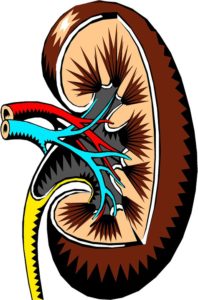Athletes commonly take Anti-Inflammatory NSAIDs like Ibuprofen during training to help reduce post workout muscle soreness.
training to help reduce post workout muscle soreness.
I previously discussed research that demonstrated taking these anti-inflammatory drugs interferes with training recovery and adaptation.
A well researched area is the effect of NSAIDs on kidney function. This is important in high risk individuals and in athletes as we’ll discuss below.
Why are NSAIDs bad for the kidneys?
According to The National Kidney Foundation…
“Heavy or long-term use of some of these medicines, such as ibuprofen, naproxen, and higher dose aspirin, can cause chronic kidney disease.”
“If you have decreased kidney function, painkillers called NSAIDs (see below) and higher dose aspirin are not recommended.”
https://www.kidney.org/atoz/content/painmeds_analgesics
Interestingly, hard training reduces kidney function as we’ll discuss in a moment. Kidney function is reduced by NSAIDs. This occurs related to blocking the formation of certain prostaglandins important for kidney function.
Hard Training and The Kidneys…
The kidneys are exceptionally important filters for the body that help clear many substances (including NSAIDs) and metabolic byproducts of training from the body. Training is a stimulus that requires blood flow shunting from the organs to the musculature. This is a shift towards the sympathetic nervous system (‘the fight or flight’ system) from the parasympathetic (‘the rest and digest’ system). This means that organ function is reduced during training to ramp up the cardiovascular output to support the more active musculature. This is why you don’t want to eat much right before a run or a hard training. Your body won’t be able to digest the food sitting in your gut and can cause digestive symptoms like nausea.
Training places additional stress on the kidney, so do NSAIDs.
Hard endurance training or competitions cause kidney failure in and of itself. As an example, kidney failure is seen in rhabdomyolysis from pushing the musculature hard beyond the kidney’s ability to work. A small study of 22 marathon runners measured labwork looking at kidney function from the marathon.
The researchers found that 81% of the marathoners demonstrated signs of acute kidney injury. 73% demonstrated structural damage to the kidney’s tubules from the marathon.
They also found that the signs continued to increase over 2 days beyond which they weren’t followed.
“23% of runners in our cohort having NGAL levels .90 ng/mL, which approach levels traditionally seen in critically ill patients such as those with hepatorenal syndrome or those immediately following cardiac surgery.”
The authors believed that several factors might explain the kidney damage in the runners including: increased body temperature, inflammation, dehydration, and reduced flow of blood to the kidneys (as I mentioned above).
One researcher, Dr Parikh commented, “Research has shown there are also changes in heart function associated with marathon running. Our study adds to the story, even the kidney responds to marathon-related stress.”
Kidney Injury and Repair Biomarkers in Marathon Runners
Sherry G. Mansour, DO, Gagan Verma, MPH, Rachel W. Pata, DPT, CCS, Thomas G. Martin, PhD, Mark A. Perazella, MD, Chirag R. Parikh, MD, PhD’Correspondence information about the author MD, PhD Chirag R. Parikh
http://www.ajkd.org/article/S0272-6386(17)30536-X/abstract
NSAIDs further reduces kidney function and therefore limit their ability to clear toxic metabolites from the blood.
This can lead to significant kidney problems and even kidney failure.
Certain people are at even greater risk… this includes but is not limited to diabetics, those with hypertension, and older individuals.
It’s also been shown that taking certain types of other medications may significantly increase your risk when you add NSAIDs.
So what’s happening when you take these drugs during training, you have reduced kidney function from the sympathetic shift to allow cardiovascular output to skeletal muscle away from organ function during a time when there is an increased need for kidney function to clear metabolites then you further reduce kidney function with the NSAID setting up what is possibly a very dangerous situation for the kidneys.
This post is not meant to give specific medical advice for you, but to provide education about possible risks. You should always talk to your doctor about taking these medications. It’s important to understand your individual risks and any possible benefits. This includes if you are taking over the counter pain relievers.
You should talk to your doctor if you are taking these medications on your own for training soreness.
If you’re experiencing pain related to your training, then there are many things that you can do to improve it without turning to these anti-inflammatories. We’ll cover those soon in another post. If you’re experiencing an injury, acute or chronic musculoskeletal pain then I suggest you see a good Chiropractor.
If you’re in the Texarkana Area, then click here and we’ll set up an appointment for you.
 Protected by Patchstack
Protected by Patchstack
Leave a Reply